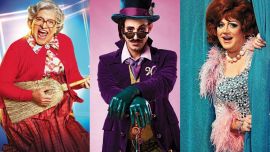President Alberto Fernández boosted his regional leadership profile this week, renewing ties with Bolivia as its new government took office and former president Evo Morales departed Argentina to return to his homeland.
In a busy 48-hour period of shuttle diplomacy, the Peronist leader flew to La Paz to attend the inauguration of new Bolivia leader Luis Arce, before zipping back to Argentina’s north to host a farewell dinner for Morales in Jujuy Province. The following day, the president waved the indigenous leader over the border, as he returned to his homeland after 11 months in exile.
The trips allowed Fernández to renew ties with a key regional ally. During his 13-year spell in power, Morales was a key ally of the Kirchnerite governments and Arce, his former economy minister who is also part of the indigenous leader’s Movement to Socialism (MAS) group, is now in charge.
Argentina’s leader also used the investiture to touch base with other world leaders.
While in La Paz, Fernández – accompanied by Foreign Minister Felipe Solá, Interior Minister Eduardo ‘Wado’ de Pedro and Strategic Affairs Secretary Gustavo Beliz – held bilateral meetings with Arce and his Vice-President David Choquehuanca, Colombia's President Iván Duque and King Felipe V of Spain.
During talks with the Spanish monarch at Bolivia’s Government House, the Peronist leader called for ties between Latin America and Europe to be strengthened.
"What I did raise with him is the great opportunity we have now to consolidate the relationship, the link between Latin America and Europe, to the maximum," Fernández said in comments released by Bolivia’s ABI state news agency.
"I believe that it is something pending for many years and that it goes beyond the Mercosur-European Union agreement, and he shares" those sentiments, he added.
Arce tweeted after the meeting with the Argentine delegation was a move towards greater “coordination and cooperation” between the two nations.
For his part, Fernández told local media in La Paz that he would seek to "work very closely" with Bolivia's new government.
"We have many things in common – we are the first and second countries in lithium production; lithium is the energy of the future and we have a lot to do together on that," he said.
"Today is a very important day for Latin America because Bolivia recovers the democracy that it should never have lost,” he added.
Fernández also met with EU officials and left-wing Spanish politician and Second Deputy Prime Minister Pablo Iglesias, before departing La Paz.
Farewell
After a farewell dinner on Sunday night in Jujuy Province, attended by a host of government ministers, Fernández accompanied Morales the following morning as the indigenous leader crossed the border from Argentina into Bolivia on foot.
The former president once again praised the Argentine leader, saying he had "saved my life."
The indigenous leader has spent 11 months in Argentina, mostly in Buenos Aires, after he resigned as president and fled the country following three weeks of protests at his controversial re-election to an unconstitutional fourth term in October 2019.
Speaking at the border crossing to reports, Fernández said Morales "should never have left" or been "mistreated as he was."
"It is the duty of each one of us to come to the aid of those peoples who are threatened and hurt by uprisings like the one suffered by Evo and Bolivia a year ago," Fernández said, alluding the efforts that saw him removed from power.
"It was an honour to have you among us," he concluded.
Homecoming
After crossing the border on Monday, Morales began a 600-mile (1,000-kilometre) homecoming tour backed by a cavalcade of vehicles. The event culminated with a rally on Wednesday at his political stronghold of Chimore, in the heart of Bolivia's coca-growing region.
"In the past year I've never felt abandoned," he told the crowd, referring to his year in exile, initially in Mexico and later in Argentina.
It was almost a year to the day since he fled the same terrain, having lost the support of the armed forces amid violent protests against his re-election to an unconstitutional fourth term.
The Bolivian leader continues to maintain that the United States had a hand in provoking the "coup d'état" that forced him from power..
Arce was meant to attend the rally, though officials briefed he was called away by state business.
Many Bolivians believe Morales’ return risks derailing the new president's stated intention to unite the country after a year of rule by a right-wing interim government.
The ex-president has repeatedly said he will not engage in politics, though his critics remain sceptical. His supporters certainly want him to re-engage. "Here are his people, he knows how to listen to the indigenous people," said Elizabeth Arcaide, a 43-year-old woman who wiped away tears during a rally in Orinoca, where hundreds turned out at a local football ground under a scorching sun to welcome home the "son of the people."
Some political experts, however, have downplayed Morales’ return.
"For supporters of Evo Morales it is important news, for the rest of the country, where he has many detractors, it's anecdotal," said analyst Carlos Cordero.
"Evo Morales is a historic leader, but politics is now in the hands of Luis Arce. Evo Morales will have to retrain himself."
– TIMES/AFP/TÉLAM
























Comments